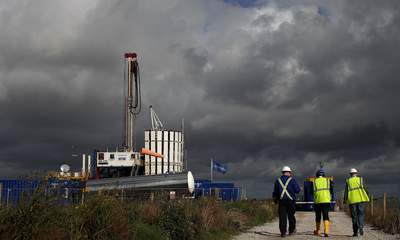Fracking Is Given Go-Ahead By Ministers
A ban on the controversial process of shale gas exploration known as fracking has been lifted by the Government.
Gas company Cuadrilla has been given the go-ahead to resume operations in Lancashire, which were halted in 2011 when test-drilling caused two minor earthquakes.
Despite the concerns of environmental groups, exploration can now continue subject to regular seismic risk assessments.
The move was welcomed by business chiefs but campaigners called it "reckless" and a "massive gamble", insisting the focus should be on renewable energy.
Energy Secretary Ed Davey insisted it would not undermine efforts to slash carbon emissions and promised that communities and environments would be protected.
The new safeguards include:
:: having a review before fracking begins to assess seismic risk and any faults;
:: the submission of a fracking plan to the Energy Department setting out how the seismic risks will be addressed;
:: seismic monitoring before, during and after the procedure;
:: a new traffic light system to categorise seismic activity, with a trigger demanding work stops when a certain level is reached.
Fracking involves drilling holes deep into the ground and then using high-pressure liquid to fracture shale rocks to release gas trapped inside.
Cuadrilla believes it could supply a quarter of the UK's gas needs from the resource in Lancashire, leaving the country less reliant on foreign imports from Qatar or Russia.
It is the only company yet to apply for an exploratory drilling licence and its site near Blackpool is currently the only proposed shale gas operation.
The go-ahead for work to re-start came after the Treasury signalled its support for the budding industry, proposing tax relief and unveiling a gas generation strategy.
Mr Davey said: "Shale gas represents a promising new potential energy resource for the UK. It could contribute significantly to our energy security, reducing our reliance on imported gas, as we move to a low-carbon economy."
Cuadrilla boss Francis Egan described the decision as a "turning point for the country's energy future".
"Shale gas has the potential to create jobs, generate tax revenues, reduce our reliance on imported gas, and improve our balance of payments," he said.
"Our exploration has shown that under Lancashire there is a belt of gas-filled shale over one mile thick.
"Today's decision will allow continued exploration and testing of the UK’s very significant shale resources in a way that fulfils the highest environmental and community standards."
He stressed that the company was committee to working "safely and responsibly at all times".
Cuadrilla had drilled three exploration wells and started fracking and testing gas flows from one when the tremors were detected and work had to be suspended.
They are in the process of drilling a fourth well and will now have to seek new permits for further work.
The company hopes to have early data on how much gas it could extract by the middle of 2013.
The decision also paves the way for potential exploration of shale reserves elsewhere in the UK, with possible operations in Balcombe, West Sussex, and in the Mendips.
Friends of the Earth executive director Andy Atkins, said: "Communities up and down the country will be disturbed by this reckless decision which threatens to contaminate our air and water and undermine national climate targets.
"George Osborne's short-sighted dash for gas will leave the country dependent on dirty fossil fuels. MPs must stand up for a safe and affordable future by insisting on clean British energy from the wind, waves and sun."
Greenpeace energy campaigner Leila Deen added: "George Osborne's dream of building Dallas in Lancashire is dangerous fantasy. He is not JR Ewing and this is not the US.
"Energy analysts agree the UK cannot replicate the American experience of fracking, and that shale gas will do little or nothing to lower bills.
"Pinning the UK's energy hopes on an unsubstantiated, polluting fuel is a massive gamble and consumers and the climate will end up paying the price."
The Government's own climate advisers have also dismissed claims that exploiting shale gas in the UK and Europe could bring down energy costs.
The Committee on Climate Change's chief executive, David Kennedy, said it was not a "game changer" on this side of the Atlantic because it could only meet a relatively small share of gas demand.

 Yahoo News
Yahoo News 

